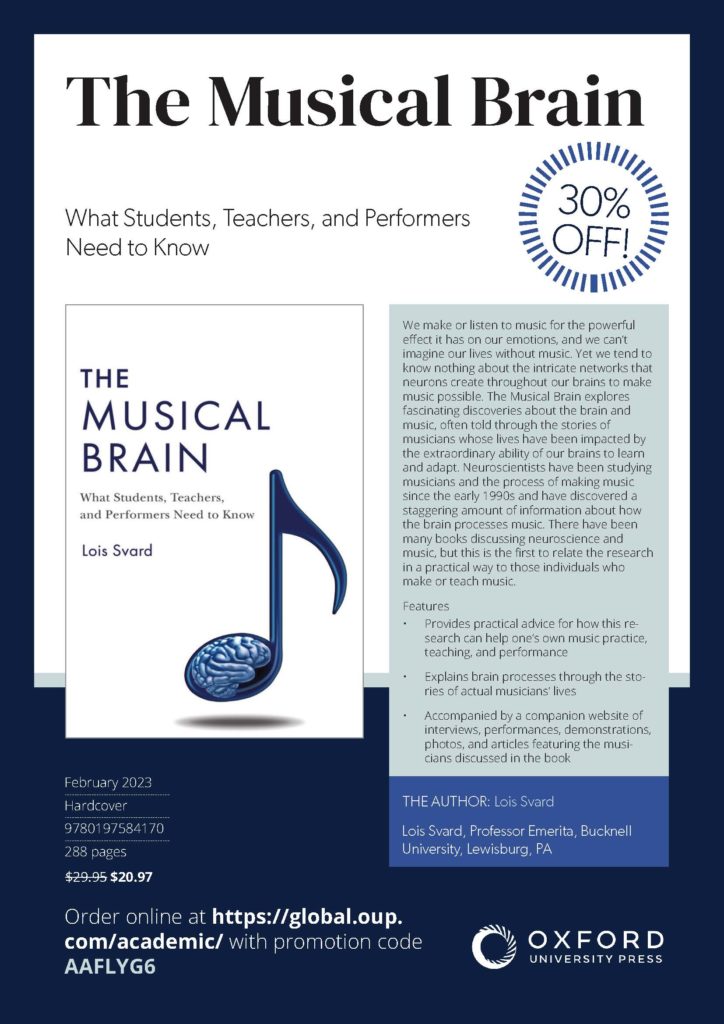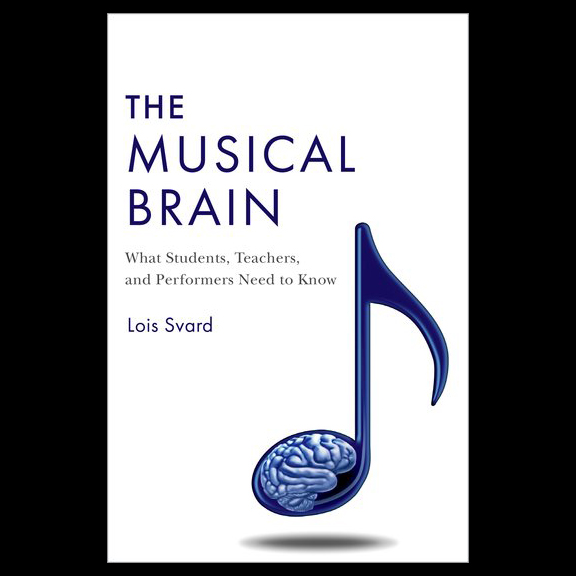The Musician’s Brain isn’t defunct, although you may wonder where I have been for the past 2 years. Actually, I spent the Covid years writing a book, and The Musical Brain: what students, teachers, and performers need to know, will be released by Oxford on March 3. (Oxford is offering a discount to my blog readers; the information is found at the bottom of this post.)
I have been studying neuroscience and music for about 25 years and writing about music and the brain on this blog for almost ten years. But I found that writing a book on the subject presented an entirely different set of challenges. The amount of research done over the past three decades by neuroscientists, cognitive psychologists, biologists, neurologists, and others is overwhelming, covering every conceivable subject having to do with brain processing for music. I have covered a lot of different topics in this blog, but there were many more that I hadn’t even touched on, so my initial dilemma was what to include in a book.
For me, two emerging themes in the research became paramount: First, music has biological foundations. We are hardwired for music just as we are for language. We are actually “born for music.” The book looks at the place music holds in our lives and why music is fundamental to who we are as human beings, exploring evidence that shows music dates back tens, perhaps hundreds of thousands of years. As further evidence of biological foundations for music, the many melodic, rhythmic, and harmonic abilities of infants are explored, as is their remarkable memory for music. Those abilities suggest that we may need to rethink how and when we begin the formal study of music with children. The Musical Brain also explores why experiencing music together is so essential in our lives, as was evident during the early days of the pandemic, when groups of individuals as well as organizations found creative ways to “make music together” online.
The second major theme in the book is neuroplasticity, or the brain’s remarkable ability to improvise. We are all born with brains that are similar, but each person’s brain changes in response to what she learns or experiences. This ability of the brain to change makes it possible for us to develop, sometimes to an extraordinary degree, the musical abilities that we have as infants.
The brain wires itself as we learn music, and some practice strategies are far superior to others at promoting strong wiring in the brain leading to stronger technical skills – and essential for procedural memory (motor skill memory) and declarative memory (memory for a piece of music). And research shows why sleep may be the most important practice strategy of all, various stages of the sleep cycle being necessary for encoding memory and others for consolidating memory.
The Musical Brain looks at focal dystonia, a condition that happens when neuroplasticity is maladaptive, leading to an inability to play one’s instrument. Many musicians have suffered from focal dystonia including Robert Schumann, who switched to a career as a composer, and Leon Fleisher, who was able to recover and return to performing.
There are other remarkable processes in the brain that promote musical learning – mirror neurons, which I’ve discussed in this blog, and motor imagery, which I have not. Both are explored in detail in the book, as is their impact on teaching and learning. Mirror neurons even have an impact on how you, as an audience member, hear a performance – important information to know as either a performing musician or audience member.
And we also look at the 30-year old question “Does music make you smarter?” It turns out there is no advantage in just listening to music (other than enjoyment), but learning to play a musical instrument has lifelong cognitive advantages, as well as being emotionally rewarding. I have always advocated for the study of music for its own sake, but it’s difficult to dismiss the importance that learning music has on math skills, executive function skills, and speech processing and language.
We all enjoy hearing stories about exceptional musicians, or individuals who have overcome great odds or handicaps to be able to perform, and in many cases, these stories are used in the book to illustrate various brain processes for music. Oxford is providing an accompanying website that provides links to interviews, performance clips, photos, demonstrations, and essays that amplify points made in the text. In my live presentations, I always use video clips to demonstrate the ideas I am discussing. The website accompanying the book does something similar, and there is information in the book about how to access the website.
This book is not just for music students, teachers, or performers. It is for anyone who loves music and wants to know more about the powerful brain processing that makes listening to and making music possible.
I hope you enjoy the book. Oxford has offered the discount below – feel free to pass the discount coupon on to friends, family, students, and colleagues. Order here with discount code AAFLYG6
More blog posts on our remarkable brains will follow – soon.





